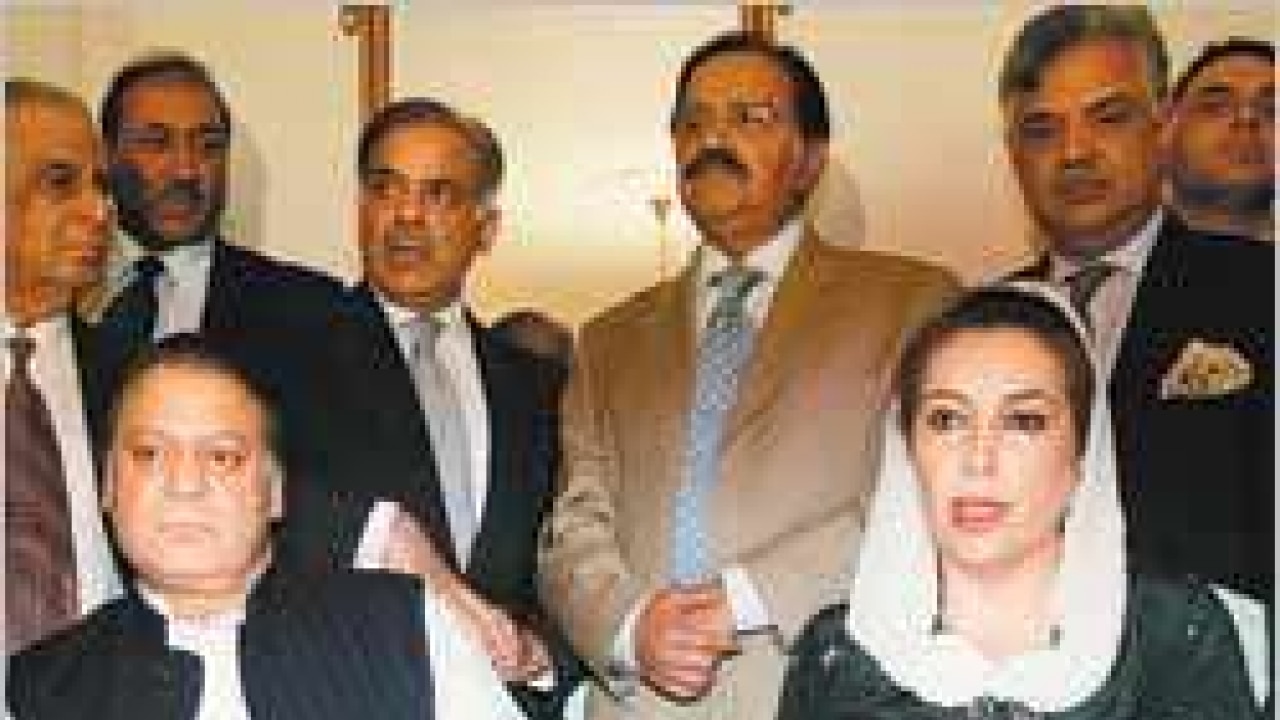
Election fever is slowly but surely gripping Pakistan. Musharraf ostensibly appears to be comfortably ensconced in power.
His obedient Prime Minister Shaukat Aziz heads a government whose parliamentary majority was engineered through an alliance comprising a party of defectors from the Muslim League formerly led by what Nawaz Sharif called the PML(Q), the Karachi based MQM, comprising representatives of Urdu speaking refugees who migrated to Pakistan following partition in 1947, and defectors from Benazir Bhutto’s People’s Party (PPP).
This majority was put together after elections held on October 20, 2002, threw up a parliament in which an alliance of Islamic Parties called the MMA secured an unprecedented number of seats, thanks largely to ISI backing.
With the PML(Q) failing to secure a majority despite help from the ISI, the government was formed with outside support from the MMA and by securing defections from PPP.
Much water has flowed in the Indus since the elections of 2002. Musharraf proclaimed himself as president following a rigged “referendum” in February 2002. He thereafter got the newly elected National Assembly to endorse a full term of five years.
Musharraf was, however, forced to turn against his former Islamic supporters in the MMA because of their overt support for the Taliban and Al Qaeda. This was unavoidable because of Pakistan’s dependence on American economic and military assistance.
While Shia-Sunni clashes have been a regular feature, politics within the Sunni Islamic Parties took a new turn when extremist Deobandi /Wahhabi elements triggered a suicide bomb attack on a gathering of leaders of the Sufi Baraeilvi sect during the birthday of Prophet Mohammed in Karachi. Over 50 leaders were killed.
There is no doubt that Musharraf’s supporters in the Pakistan Muslim League(Q) stand no chance of getting an absolute majority in free and fair elections scheduled to be held in 2007. Most observers are convinced that if free and fair elections are held, Benazir Bhutto’s PPP will emerge as the largest single party.
Nawaz Sharif’s Pakistan Muslim League (N) will also secure a sizeable chunk of seats. And if the PPP and PML(N) reach an electoral understanding, they will sweep the polls. Musharraf, therefore, faces a serious dilemma.
Given the American demands for free and fair elections, it is not going to be possible to massively manipulate them. How then are the deep misgivings and suspicions of the army establishment about Benazir Bhutto and of Musharraf himself about Nawaz Sharif to be addressed?
The question most political observers in Pakistan are now asking is that in these circumstances how can Musharraf “arrange” elections that produce a parliament which will reelect him? One way to arrange this would be to get the National Assembly (Lower House) to pass a resolution extending its term to 2008 under the constitutional provisions.
But will this not further erode his legitimacy? And how will the international community led by his American patrons react? Cynics in Pakistan say that American concerns on this score can be assuaged if Musharraf tracks down Osama bin Laden and hands President Bush his most significant triumph in his “war against terrorism,” just before the elections.
Things are, however, not going to be easy for opposition leaders like Benazir Bhutto and Nawaz Sharif who are now in exile. Bhutto, who faces serious charges of corruption, will most certainly be arrested if she returns to Pakistan.
And Nawaz Sharif can expect to be exiled again to Saudi Arabia if he seeks to return. Further, despite professions of understanding and cooperation following their meeting in London, Benazir Bhutto and Nawaz Sharif have no reason to trust each other.
How do these developments affect India and India-Pakistan relations? It is evident that with growing political uncertainty and sectarian strife, and the army confronting tribals in Baluchistan and Waziristan, Musharraf will not want tensions in relations with India, more so because of the growing warmth in Indo-American relations.
The levels of cross border terrorism will, therefore, be carefully calibrated and controlled. There is, therefore, a window of opportunity for India to pursue policies of promoting people-to-people contacts and expanding bilateral ties with Pakistan.
Prime Minister Manmohan Singh would be well advised to follow up on the proposals he made in Amritsar to resolve the Kashmir issue without any change in existing borders. But continuing cross-border terrorism will remain a challenge in the coming months.
(The writer is the former Indian High Commissioner to Pakistan.)